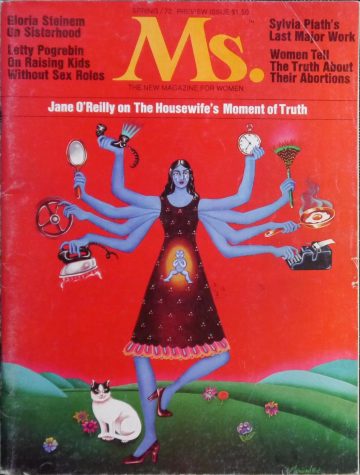“The Glorias” Review

Do you know who Gloria Steinem is? Before we watched The Glorias, we had never heard of Steinem, the feminist icon and journalist, and we had missed out on a lot. The 2020 film, directed by Julie Taymor, follows Steinem through her life as she becomes a young woman passionate about journalism: a field dominated by men. As young women working on our school’s paper, involved with women’s rights and equality ourselves, this movie was incredibly inspiring.
The aesthetics of this movie portray the beauty of a young girl finding her passions during the changing times. The film portrays all the details accurately, whether it be her family’s car they drove in the late 1930s or the style of clothing she wore while marching on Washington and speaking out for women’s rights in the 1960s. Steinem’s iconic hair and glasses were captured in such a distinctive way, the audience truly feels as though they are watching the real Gloria growing up on the screen.
The Glorias stars five separate actors who portray Gloria Steinem–Lulu Wilson, Ryan Kiera Armstrong, Alicia Vikander, Julianne Moore and Gloria Steinem herself. Although they are five very different women, these actresses all manage to share similar mannerisms and power, allowing viewers to easily recognize each woman as the same person.
The audience watches as Steinem breaks through into the journalism industry, but it was far from easy. We watch her struggle as she finally lands a job in New York, but is expected to only write what women want to read because she is one. With hesitation, Gloria agrees to write and publish her first piece about how to “find your type in men,” but adds her own twist to it. After writing her piece and meeting with her boss about her next assignment, Steinem gets sexually harassed and decides to quit her job. She then begins to work as a “playboy bunny” to make money while searching for a different job. While working as a bunny, she takes notes of all her experiences and observations and then goes on to write and publish a story about her experiences. This story became quite popular and put Steinem in the public eye. She then decided to purchase a pair of glasses after being associated with being a bunny, but little did she know her glasses and high-volume hair would become truly iconic.
Taymor portrays Steinem through each stage of her life, from a little girl to the woman she grew into present-day, riding together on a greyhound bus. We first see young Steinem riding alone before slowly all of the Glorias riding together discussing their life choices. This seems to represent growth and reflection all while aboard the bus traveling with no destination, at times going in circles, never finding a home just like Steinem never truly settled in one place.

The 1960s were a time of tremendous change for black and women’s rights. There were Equal Rights Act marches and Martin Luther King Jr’s famous “I Have a Dream” speech, and Steinem is at all of them, sometimes even leading them. Taymor uses real footage of the influential occasions paired with remade footage of DC and New York with Moore in attendance. The pairing leads to a feeling of authenticity behind the film and a sense of nostalgia for viewers that can remember the time that the civil rights movement was prominent.
The film also touches on the controversial subject of abortions. From flashbacks to a year Steinem spends in India we see that she had an abortion with a doctor that makes her swear not to give out his name. At the time, abortions were happening as frequently as they do now; however, they were much more stigmatized and illegal. Steinem and her co-creators of Ms. are seen gathering around a table discussing abortions and admitting that almost all of them have had one, agreeing that their magazine has to feature abortions. We then see a printed list of women that share that “We Had Abortions and We’re Not Going Back,” which named 53 prominent American women willing to join the movement that was (and is) often met with shame.
Touching on everything from family tension to mental illness to what it’s like being a woman in America, The Glorias covers it all. The film is available on Amazon Prime and we strongly suggest checking it out. Your life and your understanding of the time will likely be forever changed.

Akasha is a well-experienced veteran on the Newspaper staff who has been a member of Newspaper club since freshman year and lead the club as president her sophomore year. When she is not working on publishing a new edition of The Owl, you can find Akasha in the school auditorium, running through dress rehearsals and singing in the ensemble for Boulder High’s theater program. She is also one of the Co-Presidents of Women's Empowerment Club at BHS! This year, Akasha is looking forward to being a part of the newspaper staff again and hopes to spread more awareness around the school about the school paper and create a more significant following. She is interested in the field of journalism due...

Isabel Oliver is a senior at Boulder High this year. Although new to The Owl, she has always loved writing and literary arts. Isabel grew up with an Editor in Chief for a mother and has always been fascinated by the inner workings of journalism. Isabel joined The Owl to improve her journalistic writing and to report on current events that she’s passionate about. Outside of The Owl, you can find Isabel acting with Troupe 60, singing in the choir, reading a good book, watching copious amounts of Netflix, or jamming with her band. After graduating from Boulder, she hopes to go to college and become either a therapist or a social worker - although she’s leaning towards liberal arts, so that’s...

